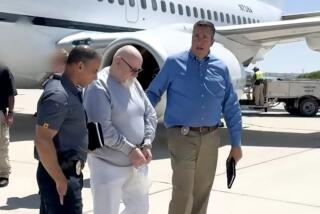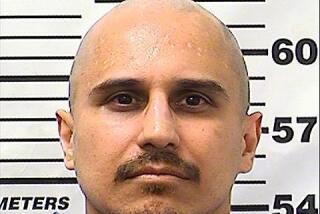Kraft’s Murder Career ‘Is a Mosaic of Depravity,’ Prosecutor Tells Jury
- Share via
A prosecutor told jurors Monday that Randy Steven Kraft’s 11 years of killing young men for his own sexual pleasure “is a mosaic of depravity, of dehumanization, of just plain evil.”
“Mr. Kraft wears a mask,” Deputy Dist. Atty. Bryan F. Brown told jurors in closing arguments at the 44-year-old computer consultant’s death penalty hearing. “His mask is worn when he’s out in society, when he’s at work, when he goes to Christmas gatherings. And then, when it’s in his interest to have a sexual euphoria, he takes the mask off.”
Convicted of 16 Murders
Kraft, who claims that he has never killed anyone, was convicted by the Superior Court jury in Santa Ana in May of 16 murders of young men in Orange County.
Prosecutors accuse Kraft of 45 murders in all but chose to add just eight new killings in the death penalty hearing: six more young men in Oregon and two in Michigan, whose bodies were dumped by roadways while Kraft was in those states on business. Most had been sexually mutilated or abused.
Death or Life in Prison?
After a yearlong trial which some legal experts say is the most expensive ever in Orange County, if not the state, jurors could begin deliberations as early as this afternoon on the single issue before them: Should Kraft receive a verdict of death, or of life in prison without parole?
Judge Donald A. McCartin would have the authority to set aside their verdict if they vote for death. But no Orange County judge has done that since the death penalty was reinstated in California in 1977.
The jurors listened grimly as Brown, in a deliberate, low-key style, recited a litany of horrors in the crimes linked to Kraft: burned-out eyes, emasculations, sodomies, victims photographed in death in lewd poses.
“Then they were dumped naked along the road, like trash,” Brown said.
Victim’s Parents Weep
Brown noted that the body of one victim, 22-year-old Mark Howard Hall, was left in a grotesque condition, and he asked how Kraft could have done such a thing.
“How could you think to do things like that? And then, if you even thought it in the wildest stretch of your imagination, how could you implement it?”
Hall’s parents, who had flown in from Idaho for the closing argu ments, shuddered at hearing the list of their son’s injuries and began to weep.
The three weeks of defense testimony from Kraft’s friends and family praising his character cannot compare to “the evil Mr. Kraft has perpetrated on these victims,” Brown went on to tell the jurors.
Kraft attorneys James G. Merwin and C. Thomas McDonald are both scheduled to make closing arguments to the jurors today.
They have taken two approaches in the penalty hearing in attempt to save Kraft’s life. One is attempting to show jurors that there is a lot of good in Kraft which could be put to use in prison. The other is through evidence from a specialist in a brain test called a PET scan that Kraft has brain abnormalities that affect his impulses and his sexual drive.
But Brown told jurors Monday that there is nothing wrong with Kraft’s mind, “other than he likes to kill people for sexual pleasure.”
Kraft was a successful businessman living an openly gay life style in Long Beach when he was arrested on May 14, 1983. Two California Highway Patrol officers had spotted his 1979 Toyota Celica weaving on northbound Interstate 5 in Mission Viejo. They were stunned to discover a dead Marine in the front passenger seat. The victim had been strangled and his pants pulled down.
A Matter Luck
“Just by luck,” prosecutor Brown told the jurors, describing that arrest scene, came “the end of an era, of Mr. Kraft flying freeways murdering and dehumanizing people.”
If not for the alert patrol officers, Brown said, there was no telling when Kraft would finally have been caught.
Kraft’s intelligence and the careful planning of his night-time excursions are proved by the number of years he carried on his crimes without being caught, Brown said.
The prosecutor chided Kraft, who had questioned most of the defense witnesses in the penalty hearing himself, for asking each of them whether they knew him to like or own weapons.
“They were looking for the wrong kinds of weapons,” Brown said.
The prosecutor told the jurors that Kraft’s weapons were prescription drugs, to weaken his victims, shoelaces, to bind their wrists, their own belts, to strangle them, and beer in a cooler, to wash down the drugs.
“The platform Mr. Kraft uses (his car), once you get your victim in there, he’s got all his tools right there. Mr. Kraft uses weapons that one would not ordinarily see as a weapon,” Brown said.
Brown added that it is no argument against the death penalty that Kraft lived a life away from the killings which the prosecutor described as “abnormally normal.”
Pictures for the Jury
Brown told jurors that they should take the biographical photo album of Kraft’s life introduced by the defense and take the pictures and hang them up in the jury room. But going through the pictures chronologically, he told them, they should insert pictures of the 24 murder victims and insert them in the years where the murders occurred.
“As you go through his picture life, go through his life of killing and maiming, and integrate them,” Brown said. “And then ask yourself how much sympathy, compassion, and pity does Mr. Kraft deserve from you.”
More to Read
Sign up for Essential California
The most important California stories and recommendations in your inbox every morning.
You may occasionally receive promotional content from the Los Angeles Times.









